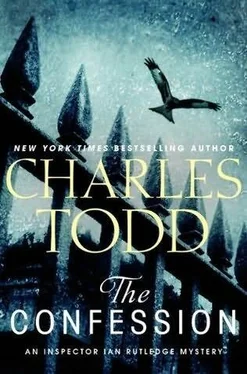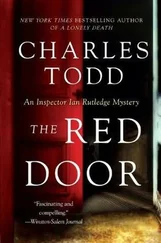Charles Todd - The Confession
Здесь есть возможность читать онлайн «Charles Todd - The Confession» весь текст электронной книги совершенно бесплатно (целиком полную версию без сокращений). В некоторых случаях можно слушать аудио, скачать через торрент в формате fb2 и присутствует краткое содержание. Жанр: Полицейский детектив, на английском языке. Описание произведения, (предисловие) а так же отзывы посетителей доступны на портале библиотеки ЛибКат.
- Название:The Confession
- Автор:
- Жанр:
- Год:неизвестен
- ISBN:нет данных
- Рейтинг книги:5 / 5. Голосов: 1
-
Избранное:Добавить в избранное
- Отзывы:
-
Ваша оценка:
- 100
- 1
- 2
- 3
- 4
- 5
The Confession: краткое содержание, описание и аннотация
Предлагаем к чтению аннотацию, описание, краткое содержание или предисловие (зависит от того, что написал сам автор книги «The Confession»). Если вы не нашли необходимую информацию о книге — напишите в комментариях, мы постараемся отыскать её.
The Confession — читать онлайн бесплатно полную книгу (весь текст) целиком
Ниже представлен текст книги, разбитый по страницам. Система сохранения места последней прочитанной страницы, позволяет с удобством читать онлайн бесплатно книгу «The Confession», без необходимости каждый раз заново искать на чём Вы остановились. Поставьте закладку, и сможете в любой момент перейти на страницу, на которой закончили чтение.
Интервал:
Закладка:
Drawing up in the shallow space before the gates, Rutledge said, “Wait here. Do you mind? I’d like to explore a little.”
“I can just see the roof of a house behind those trees. Is that where you’re going?”
“Yes.”
“I’ll come with you,” she replied. “I’d rather not sit here alone. I could almost believe eyes are watching our every move. You could hide half a battalion in that grass across the way. I should have thought German spies by the dozens would have found this to be a wonderful landing place. How far is the North Sea, do you think?”
“A few miles. I’m sure this part of Essex was heavily patrolled by the Coastguard for that very reason,” he said. “I’m told there was an aerodrome somewhere out here. They’d have been doubly watchful. Are you certain you want to trek through that tangle?”
She smiled. “Of course I don’t.”
He helped her out of the motorcar and lifted the heavy chain for her to pass under it. They tramped through the high grass and weeds, Rutledge leading the way to break a path for her, and moved up what had once been the drive. Briars caught at her skirts and pulled at the hem of her short jacket.
“Really, Ian!” she said at one point. But they followed the drive for perhaps a quarter of a mile before they reached the trees. Walking through them was easier, but the undergrowth hadn’t been cleared for some time, and at one point a fallen tree blocked their way. Helping her over it, he looked beyond where they were standing and realized that he could see the house clearly now.
It was tall, brick built, with peaked roofs, long windows facing him, and an array of chimneys. He could just pick out the swing of the drive before the main door.
The windows were blank gray spaces against a gray, sunless day, giving the house an abandoned look. By the time they reached the broad steps up to the black painted door, it was clear that the house hadn’t been lived in for some time.
Looking up at the date incised into a plain scroll set into stone above the door, Frances read, “1809. It’s really a rather handsome house, isn’t it? What a pity that it’s been left to wrack and ruin. I wonder what happened to the family that lived here?”
“The heir probably died in the war.”
“Sadly, yes. Very likely.”
A pair of unclipped bushy evergreens grew to either side of the steps, and he pushed his way through the scraggly branches of the one to his left in order to peer through the nearest window. “Dust sheets,” he reported. “But there’s a wide entry, with doors to either side, and a staircase rising just beyond. Elegant ceiling, what I can see of it.”
From the condition of the drive and the closed look to the house, it was clear that Wyatt Russell was not living here now. And it was obvious the house hadn’t been reopened after the war. Why had he given Essex as his address, if he was currently living in The Marlborough Hotel, not just staying a few days there?
Rejoining Frances, Rutledge added, “Shall we walk round to the water? There may be a bench or two where we can sit and admire the view.”
“I’m withholding all expectations,” she said dubiously, “but lead on.”
A broad terrace faced the river, with long windows looking out to it and large urns marking either side of the steps. Whatever had once been planted in them, they were empty now. From here, across the overgrown lawn running down to the river’s edge, the view was spectacular: a broad sweep to marshes on the far side that seemed to come alive with color when the sun broke through the clouds for a moment. On the rotting boards of a landing stage at the bottom of the lawn, a heron stared down at his reflection in the mirrored darkness of the silently moving water. Then in one swift, fluid action, his neck stretched down and came up with a small fish, silvery in his beak. And then the sun went behind the clouds once more, and the view seemed diminished.
But there were neither chairs nor benches.
“What a lovely spot,” Frances said, standing beside her brother. “I can imagine sitting here on a summer’s evening, watching the water and talking to friends. Did you know the people who lived here? Is that why you came?”
“No.”
He turned to look up at the house, scanning the windows. But if there was someone inside on the upper floors, he-or she-couldn’t be seen from the terrace below. Heavy drapes had been drawn across the panes on this side of the house, their faded colors somehow sad.
After a time Rutledge turned, and they walked back the way they’d come.
Halfway up the long drive, Frances said, “Ian, I’ve been meaning to ask you. Have you seen Meredith Channing recently? She appears to have gone away. Only the other day, Maryanne Browning was asking if I’d had any news of her.”
Rutledge knew where Meredith Channing had gone. But he shook his head. “Scotland, perhaps?” he said. “There was mention of a brother-in-law there?”
“Yes, that must be it,” Frances said, but there was a touch of doubt in her voice.
At the gates he inspected the pillars. The name of the house hadn’t been incised here. But he was nearly certain it would have been River’s Edge. Unless there was another house ahead?
In the motorcar once more, they drove on.
In another mile or so, a dead tree lifted bare, twisted arms toward the sky, and just beyond, there was a church, a short tower rising from the plain upright brick facade.
Early Victorian, at a guess, Rutledge thought, looking up at the tower. And not a very happy example of village church at that. He wondered what his godfather, the architect David Trevor, would make of it, and he smiled.
The sign between the porch and the road was almost Pre-Raphaelite in its design and would have done justice to an Arthurian legend. It read, in elegant letters set out in gold leaf, THE CHURCH OF ST. EDWARD THE CONFESSOR.
Rutledge regarded that with wry amusement. Very fitting, he thought.
Beneath were the times of services and the name of the pastor: Morrison. Below that was a quotation from the Psalms:
I will lift mine eyes unto the hills…
“ What is it doing out here? In the middle of nowhere?” Frances asked as they drew even with the signboard. “And there’s no Rectory. No churchyard. How very odd.”
It was not strictly speaking ugly, but there was something about the church that stirred the voice in Rutledge’s head. Hamish had been quiet all morning, and now he was a restive presence in the back of Rutledge’s mind.
Rutledge tried to ignore him. He said to his sister, “Perhaps the village was moved.”
“Yes, that could be, of course. But surely not the churchyard as well?”
He braked, the engine idling. A gust of wind hit the motorcar, shaking it. “It may serve a scattered population.”
“It looks as if it’s been exiled,” she remarked. Then, turning to her brother, she asked, “Ian, what brought you here? And don’t tell me again that it’s curiosity.”
“Actually it was. That much is true. I wanted to have a look at this part of Essex.”
“Then it has to do with an inquiry?”
“More a bit of intuition heaped on suspicion and doubt.”
Above their heads, wind swirled around the tower, and the clapper touched the mouth of the bell with a sound almost like that of a distant buoy.
The church was in good repair. It appeared that there was a priest who conducted services here. But who were his parishioners? The house they’d passed was too far away, and there was no sign of a village in any direction.
“It makes me sad to look at that church. Is there anything beyond here?”
“Let’s find out.”
Driving on once more, they traveled at least another three miles before they reached the first outposts of a village. Which, he realized, surely meant that the deserted house they’d seen must indeed be River’s Edge.
Читать дальшеИнтервал:
Закладка:
Похожие книги на «The Confession»
Представляем Вашему вниманию похожие книги на «The Confession» списком для выбора. Мы отобрали схожую по названию и смыслу литературу в надежде предоставить читателям больше вариантов отыскать новые, интересные, ещё непрочитанные произведения.
Обсуждение, отзывы о книге «The Confession» и просто собственные мнения читателей. Оставьте ваши комментарии, напишите, что Вы думаете о произведении, его смысле или главных героях. Укажите что конкретно понравилось, а что нет, и почему Вы так считаете.












